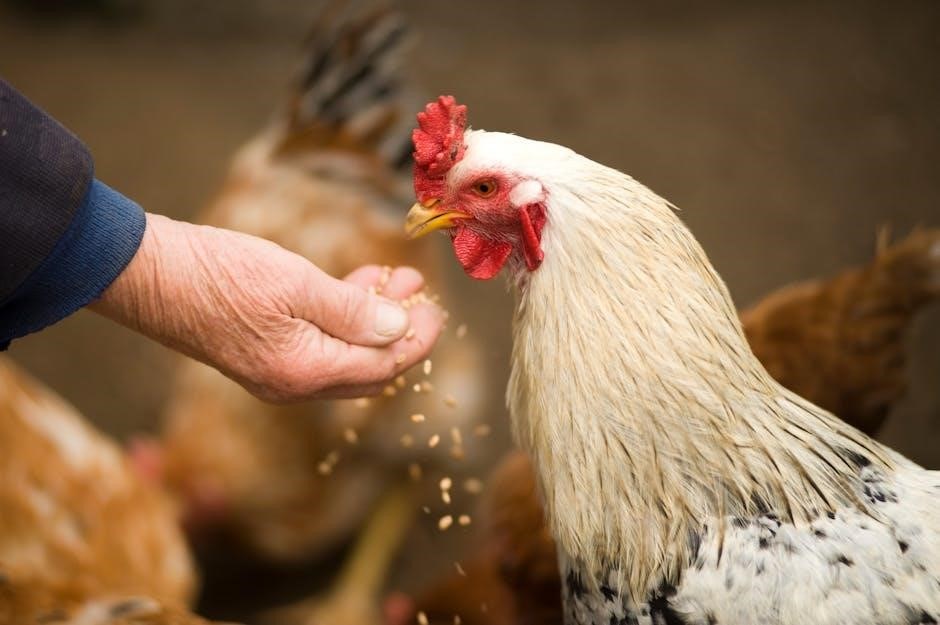The Dekalb Seed Guide is a comprehensive resource for farmers, offering insights into high-performance seed solutions for corn, soybeans, silage, and alfalfa. It highlights Dekalb’s legacy of innovation, sustainability, and commitment to maximizing crop yield and quality through advanced agronomic practices and cutting-edge seed technology.
Overview of Dekalb Seed History and Legacy
DEKALB has built a century-long legacy as a pioneer in seed innovation, delivering high-performance products that empower farmers globally. Founded on a commitment to agricultural excellence, the brand has consistently pushed boundaries in corn, soybeans, and forage crops. DEKALB’s history is marked by groundbreaking advancements, earning it a reputation as a trusted partner for growers seeking reliable, yield-optimized solutions. Its dedication to research and sustainability has cemented its status as a leader in modern agriculture, inspiring future generations of farmers and contributing to food security worldwide.
Importance of the Dekalb Seed Guide for Farmers
The Dekalb Seed Guide is an essential resource for farmers, providing detailed insights into high-performing seed solutions tailored to diverse agricultural needs. It offers a wealth of information on corn, soybeans, silage, and alfalfa, helping growers make informed decisions to optimize yields and adapt to local conditions. The guide includes crop-specific recommendations, agronomic tips, and sustainability practices, ensuring farmers can maximize their productivity while maintaining environmental stewardship. By leveraging Dekalb’s legacy of innovation, the guide empowers farmers to achieve their goals effectively, making it a vital tool for modern agricultural success.

Dekalb Corn Seed Offerings
Dekalb offers high-performing corn seeds with exclusive genetics and strong agronomic traits, ensuring optimal yield potential and adaptability across diverse growing conditions, supported by sustainable practices.
Hybrid Development and Innovation
Dekalb’s hybrid development focuses on creating high-performing corn seeds tailored to diverse agronomic conditions. Through cutting-edge research and development, Dekalb delivers innovative solutions that enhance yield potential, disease resistance, and stress tolerance. Their exclusive genetics ensure adaptability across varying climates and soil types, while advanced trait technologies like drought tolerance and pest resistance provide growers with reliable options. Dekalb’s commitment to innovation empowers farmers to achieve consistent results and maximize productivity. By leveraging decades of expertise, Dekalb continues to lead in developing hybrids that meet the evolving needs of modern agriculture, ensuring sustainability and efficiency for future generations.
Key Corn Products and Varieties for 2023
Dekalb’s 2023 corn portfolio features a robust lineup of high-performing hybrids designed to optimize yield and adaptability. Key products include DKC21-36 and DKC64-22, known for their strong emergence and disease resistance. These varieties offer excellent growth in diverse conditions, with traits like drought tolerance and pest resistance. DKC66-06 stands out for its exceptional yield potential and stress management. Dekalb’s 2023 offerings are tailored to meet the needs of modern farming, ensuring growers can achieve maximum productivity and profitability. With a focus on innovation and reliability, these hybrids are built to excel in various environments, making them a top choice for farmers seeking consistent results.
Corn Seed Management Tips for Optimal Yield
Optimizing Dekalb corn seed performance begins with proper soil preparation and timely planting. Ensure soil moisture levels are adequate for germination and emergence. Plant seeds at the recommended depth and spacing to maximize sunlight and nutrient uptake. Utilize seed treatments to protect against early-season pests and diseases. Monitor soil health and apply balanced fertilization based on soil tests. Implement integrated pest management strategies, including scouting for pests and applying herbicides as needed. Regularly monitor crop stages and adjust irrigation and nutrient applications to support growth. Properly store seeds to maintain viability for future planting. These practices ensure Dekalb corn seeds reach their full yield potential.

Dekalb Soybean Seed Offerings
Dekalb offers high-performing soybean seeds, including Enlist E3 and XtendFlex varieties, designed to deliver high yield potential and adaptability for diverse farming conditions in 2023.
Enlist E3 and XtendFlex Soybean Varieties
Dekalb’s Enlist E3 and XtendFlex soybean varieties offer advanced weed control and flexibility for farmers. Enlist E3 provides tolerance to multiple herbicides, including 2,4-D, dicamba, and glyphosate, reducing weed pressure and improving yield potential. XtendFlex varieties are compatible with the dicamba-based XtendiMax system, offering robust weed management options. Both trait platforms are designed to adapt to diverse growing conditions, ensuring farmers can maximize soybean productivity while managing resistance. These innovations reflect Dekalb’s commitment to delivering high-performance solutions tailored to modern agronomic challenges.
Expanding Soybean Options for 2023
Dekalb expanded its soybean portfolio for 2023, introducing new varieties with enhanced traits and improved performance. These include Enlist E3 and XtendFlex options, offering flexibility in weed management and resistance to key pests. The 2023 lineup features 29 new products, spanning various maturities, to cater to diverse growing conditions. Farmers can benefit from increased yield potential, better disease tolerance, and adaptability to regional climates. Dekalb’s commitment to innovation ensures growers access to cutting-edge genetics, enabling them to optimize soybean production and meet market demands effectively. These advancements underscore Dekalb’s dedication to supporting sustainable and profitable farming practices.
Soybean Seed Placement and Agronomic Practices
Proper soybean seed placement and agronomic practices are critical for maximizing yield and quality. Dekalb recommends optimal soil preparation, with planting depths of 1-1.5 inches in well-drained soils. Timing is key, with planting during the optimal window for your region to ensure strong emergence. Row spacing and population management should be tailored to soil type and moisture levels. Incorporating seed treatments can enhance protection against early-season pests and diseases. Regular monitoring for pests, diseases, and nutrient deficiencies, along with timely applications of fertilizers and pesticides, supports healthy growth. Dekalb’s resources provide region-specific guidance to help farmers achieve optimal soybean production outcomes.

Dekalb Silage and Alfalfa Seed Offerings
Dekalb offers high-performance silage hybrids bred for superior digestibility and tonnage, along with premium alfalfa seed varieties designed for maximum yield and nutritional quality in forage production.
High-Performance Silage Hybrids
Dekalb’s silage hybrids are engineered for exceptional yield and forage quality. Bred in top silage-producing regions, these hybrids ensure outstanding digestibility and nutritional value. They are tailored to meet the demands of modern dairy and livestock operations, offering high tonnage potential and robust agronomic traits. By leveraging advanced seed technology, Dekalb silage hybrids adapt to diverse growing conditions, ensuring consistent performance. Farmers can rely on these hybrids to optimize their forage production, supporting healthier livestock and sustainable farming practices. Dekalb’s commitment to innovation ensures that each hybrid is designed to maximize efficiency and profitability for growers.
Alfalfa Seed Varieties and Management
Dekalb offers premium alfalfa seed varieties designed for high yield and durability. These seeds are bred to thrive in diverse climates, ensuring consistent performance and resilience against pests and diseases. Proper management practices, such as optimal planting times, soil preparation, and irrigation, are crucial for maximizing alfalfa productivity. Dekalb’s seed guide provides detailed recommendations on seeding rates, fertility, and pest control to help farmers achieve optimal results. By adhering to these guidelines, growers can maintain healthy stands, improve forage quality, and sustain long-term soil health, making Dekalb alfalfa seeds a reliable choice for livestock feed and sustainable farming systems.
Maximizing Forage Quality and Yield
Maximizing forage quality and yield requires careful planning and execution. Dekalb’s high-performance silage hybrids are bred for exceptional digestibility and tonnage potential. Proper soil preparation, balanced fertility, and timely irrigation are critical for optimal growth. Regular monitoring for pests and diseases, along with proactive management, ensures healthy stands. Harvesting at the ideal stage maximizes nutrient content and palatability. Dekalb’s seed guide provides detailed insights into crop staging, soil health, and pest management to help growers achieve peak productivity. By following these practices, farmers can produce high-quality forage, supporting livestock health and sustainable farming systems while maximizing yield potential and resource efficiency.

Dekalb Grain Sorghum and Canola Seed Offerings
Dekalb offers high-yield grain sorghum seeds and canola hybrids tailored for diverse growing conditions. These products emphasize adaptability, yield potential, and sustainability, ensuring optimal performance across various regions and farming systems.
Grain Sorghum Seeds for High Yields
Dekalb grain sorghum seeds are engineered for exceptional yield potential and adaptability across diverse growing conditions. With excellent emergence and vigorous growth, these seeds ensure robust stands and resilience against environmental stresses. Dekalb’s grain sorghum offerings are bred to maximize water use efficiency and nutrient uptake, translating to higher profits for farmers. The seeds are supported by Dekalb’s commitment to sustainability, ensuring eco-friendly practices without compromising on performance. Farmers can rely on Dekalb grain sorghum seeds to deliver consistent results, making them a reliable choice for achieving high-quality forage and grain production.
Canola Hybrids for Diverse Growing Conditions
Dekalb’s canola hybrids are designed to thrive in various environmental conditions, ensuring optimal performance for farmers. These high-yield hybrids feature strong disease resistance and adaptability, making them suitable for different soil types and climates. With a focus on early maturity and high oil content, Dekalb canola seeds provide excellent returns. The hybrids are developed using advanced breeding technologies to enhance resilience against pests and diseases, ensuring consistent results. Dekalb’s commitment to innovation and sustainability makes their canola hybrids a reliable choice for farmers seeking to maximize productivity while maintaining environmental stewardship.
Oilseed Crop Management Strategies
Dekalb’s oilseed crop management strategies emphasize soil health, proper planting techniques, and pest control to maximize yields. Planting high-quality seeds in well-prepared soil ensures strong emergence and vigor. Regular monitoring for pests and diseases, combined with integrated pest management (IPM) practices, helps protect crops. Weed control is critical, as competition can significantly reduce yields. Dekalb recommends balanced fertilization and timely harvesting to optimize oil content and quality. By focusing on sustainable practices and tailored agronomic advice, farmers can achieve consistent results and long-term profitability with Dekalb’s oilseed offerings.

Agronomic Resources and Tools
The Dekalb Seed Guide provides essential agronomic resources, including crop staging guides, seed germination recommendations, and soil management tips, to help farmers optimize yields and make informed decisions.
Crop Staging Guides and Agronomic Charts
Dekalb provides detailed crop staging guides and agronomic charts to help farmers monitor growth stages accurately. These tools offer insights into optimal planting times, soil conditions, and pest management strategies. By aligning with specific crop development milestones, farmers can make informed decisions to maximize yields. The guides also include visual aids and actionable recommendations tailored to various regions and growing conditions. This resource ensures farmers stay on track with best practices, from seed germination to harvest, supporting sustainable and efficient farming operations.
Seed Germination and Planting Recommendations
Dekalb provides detailed seed germination and planting recommendations to ensure optimal results. These guidelines cover soil temperature, moisture levels, and seed placement depth for various crops. Farmers can access charts and resources to determine the best planting times for their region. Dekalb also offers tips for proper seedbed preparation and spacing to maximize germination rates. By following these recommendations, growers can achieve stronger seedling emergence and set the foundation for a successful harvest. Dekalb’s expertise in seed technology ensures tailored advice for diverse growing conditions, helping farmers make informed decisions for their fields.
Soil and Pest Management Tips
Dekalb offers expert soil and pest management tips to enhance crop health and productivity. Proper soil preparation, including testing and fertilization, ensures optimal growing conditions. Regular monitoring for pests like rootworms and aphids is crucial for early detection and control. Dekalb recommends integrated pest management (IPM) practices, such as crop rotation and biological controls, to minimize chemical use. Additionally, Dekalb seeds are bred with built-in resistance to pests and diseases, further safeguarding yields. By following these guidelines, farmers can protect their investments and promote sustainable soil health, ensuring robust plant growth and higher returns.
Regional Seed Recommendations
Dekalb provides tailored seed solutions for specific regions, ensuring optimal performance in diverse climates; From Western Canada to US zones, Dekalb’s localized expertise helps farmers maximize yields and adapt to local growing conditions.
Seed Varieties for Western Canada
Dekalb offers tailored seed solutions for Western Canada, focusing on high-performance hybrids adapted to the region’s unique conditions. These include canola, corn, and silage varieties designed for optimal yield in cool, short-season environments. Dekalb’s regional expertise ensures seeds thrive in Western Canada’s challenging climates, with traits like drought tolerance and pest resistance. The 2023 lineup introduces new canola hybrids with improved disease resistance and yield potential. Silage products are bred for digestibility and tonnage, while corn varieties are suited for moisture-stressed areas. Dekalb’s commitment to regional adaptation helps farmers meet local challenges and achieve sustainability goals.
US-Specific Seed Options and Zones
Dekalb provides regionally adapted seed solutions tailored to diverse US growing conditions. From the Midwest to the South, Dekalb offers corn and soybean varieties optimized for specific maturity zones, ensuring optimal performance. Products like Dekalb corn hybrids are designed for high yield potential in varying soil types and climates.
US-specific options include drought-tolerant corn and herbicide-resistant soybeans, addressing regional challenges. Dekalb’s seed portfolio supports sustainability and adapts to local agronomic needs, helping US farmers maximize productivity and resource efficiency across different growing zones.
Adapting Seeds to Local Growing Conditions
Dekalb seeds are meticulously bred to thrive in varied local conditions, ensuring adaptability across diverse regions. Advanced breeding techniques and regional testing enable Dekalb to offer tailored solutions, from drought-tolerant corn to herbicide-resistant soybeans, suited to specific soil types and climates. This localized approach maximizes yield potential while addressing unique challenges faced by farmers, ensuring optimal performance and sustainability in every field.
Sustainability and Stewardship
Dekalb prioritizes environmental responsibility, promoting sustainable farming practices and resource efficiency. Their commitment ensures safer agricultural methods while protecting natural resources for future generations through innovative seed solutions.
Environmental Responsibility in Seed Production
Dekalb integrates sustainable practices into every stage of seed production, from soil preparation to packaging, ensuring minimal environmental impact. Advanced technologies optimize water and energy use, reducing the ecological footprint. By promoting eco-friendly farming methods, Dekalb supports farmers in maintaining high yields while preserving natural resources. The brand’s commitment to environmental stewardship ensures seeds enhance productivity and contribute to a healthier planet for future generations.
Sustainable Farming Practices with Dekalb Seeds
Dekalb seeds are designed to support sustainable farming practices, promoting soil health, water conservation, and efficient resource use. By leveraging advanced seed technology, farmers can achieve higher yields while reducing environmental impact. Dekalb’s commitment to sustainability includes developing seeds with improved drought tolerance, disease resistance, and nutrient efficiency, helping farmers maintain productivity without over-reliance on inputs. These practices not only benefit the environment but also ensure long-term farm profitability and resilience, aligning with global efforts to promote eco-friendly agriculture.
Commitment to Safety and Resource Efficiency
Dekalb is dedicated to ensuring safety and resource efficiency throughout its seed production processes. By adhering to rigorous safety protocols and sustainable practices, Dekalb minimizes environmental impact while delivering high-quality seeds. This commitment extends to farmers, providing them with tools and guidelines to manage resources effectively, optimize yields, and reduce waste. Dekalb’s focus on safety and efficiency supports both agricultural productivity and environmental stewardship, fostering a responsible approach to farming for future generations.
Final Thoughts on the Dekalb Seed Guide
The Dekalb Seed Guide serves as an indispensable tool for farmers, offering detailed insights into cutting-edge seed solutions. By focusing on innovation, sustainability, and performance, it equips growers with the knowledge and resources needed to optimize yields and adapt to diverse agricultural conditions. The guide’s comprehensive coverage of corn, soybeans, silage, and alfalfa seeds, along with expert agronomic advice, ensures farmers are well-prepared to meet current challenges and future demands; Dekalb’s commitment to excellence is evident throughout, making the guide a trusted companion for agricultural success.
Future Innovations in Dekalb Seed Technology
Dekalb continues to pioneer advancements in seed technology, focusing on sustainability and yield optimization. Investments in research and development aim to address climate change challenges and enhance crop resilience. Emerging technologies, such as AI-driven seed selection and precision gene editing, are being explored to tailor seeds to specific environments. Dekalb is also collaborating with global research institutions to develop seeds that require fewer inputs while maintaining high performance. These innovations promise to revolutionize farming, ensuring food security and environmental stewardship for future generations. By integrating cutting-edge science, Dekalb remains at the forefront of agricultural progress, empowering farmers to adapt and thrive in evolving conditions.